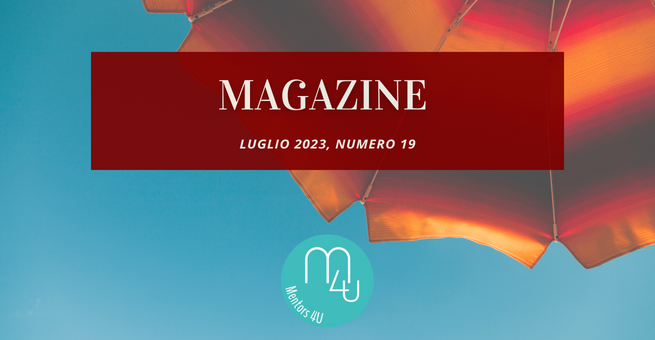Tell us a little bit about yourself, your background, and your studies. How did you get in touch with the reality of M4U Colombia?
Back in 2016 I met Daniel Uribe through a mutual friend. Daniel had the idea to connect underrepresented students from all universities around Colombia to the best opportunities possible. This was and still is a big challenge in Colombia: a constant mismatch between talent and opportunities. We didn’t want to reinvent the wheel, so Daniel had this brilliant idea to replicate best practices from an organization he admired: M4U Italy. I came into the equation helping out with this project because we both shared an almost existential angst of seeing so much wasted talent in our home country without clear options after they graduated from college.
We designed a program to match the reality of our home country using some best practices from M4U Italy as well as some well-documented mentorship research we found back then. I had studied economics and philosophy as an undergrad so the idea of connecting some dots from my studies with this project of mentoring students was an exciting experience which surprisingly resonated with mentors as well as mentees who joined the program. After we launched a couple of cohorts with M4U Colombia, I became more intrigued and enthusiastic with the idea of developing talent and the exponential positive impact this could have for our home country.
How do you think the Colombian job market looks for young people? What are the most important skills for young professional to obtain?
The Colombian job market has evolved throughout the years with double-digit unemployment rates. This has dramatically impacted young people in many ways, considering the historical reality of political violence, crime and poverty. In this regard, there is a feeling of disenchantment among young professionals who even after putting in the effort can’t find a clear mechanism to build fulfilling projects of life. This is a very hard socioeconomic reality with a vicious intergenerational cycle.
In this context, young professionals in Colombia need to build a multilayer set of skills. They’ve learnt a mechanism of resilience and resourcefulness that makes them great entrepreneurs. But they also need to be able to perform in competitive settings outside their natural environment. This is where I feel new important skills need to be developed. A couple of them are oral and written communication skills. This is crucial because young professionals from Colombia will need to be able to articulate their ideas for different audiences and in different contexts. Problem solving in the future will require people to articulate and dissect ideas to help organizations and communities to bring about change.
A second set of skills is a disciplined growth mindset. We’ve heard a lot about this before, but my impression is that people struggle to create a plan to nourish their current scope of knowledge and practical skills. Since there is so much information, we tend to think that all we need to do is consume it endlessly. The opposite is true. Young people need to learn how to clear out their mental space and schedules to invest valuable hours learning a new language (from Python to Portuguese), practicing a new sport (from chess to running) or discovering a new mental domain (from bakery to computer science). A growth mindset will incorporate new domains of knowledge or skills as long as we put in the hard work.
Are the universities preparing the students adequately to enter the job market? What are some ways they could improve?
Universities are great to create community and foster conversations. Some are better than others, but there is a paradoxical commonality: they encapsulate these communities and valuable conversations inside their own fences. There is a kind of paywall that hurts conversations and community-building inside universities, because they only speak to themselves. This affects the way students are prepared for the job market as classrooms sometimes feel immune to the reality of communities and organizations in the real world. At this level communication is almost null. Universities will become more relevant in the future as long as they connect instead of isolating themselves from a changing reality. As long as classrooms connect with organizations, governments and communities new venues for learning and knowledge transfer will arise, which in turn will directly benefit students.
This is what M4U Colombia has tried to do in the last couple of years with mentoring programs tailored for universities, nonprofits and companies around Colombia. It is only one element of the equation, but we feel that as long as working professionals and students have the opportunity to chat, connect and build relationships, there is a better chance for students to succeed once they enter the job market.
What are the most in-demand jobs right now? How do you think this will change over the years? How can young professional stay relevant for future professions?
The job market is rapidly changing, absorbing specialized skills for both the digital as well as manufacturing markets. I think in the future young professionals will stay relevant as long as they are able to articulate ideas from different domains of knowledge. For example: lawyers will have to calibrate algorithmic models to help them dissect their own documents. Engineers will have to write concise prompts to train a specific large language model. An entrepreneur trying out a new digital travel agency will have to understand a new market for entertainment based on niche experiences. In this sense, we need to develop a conversational competence in different domains to be able to createnew narratives and come up with ideas that borrow concepts from a wide set of disciplines.
I also think there would be a premium in the future for young professionals who excel in the physical world. People will search for services and products that connect them with nature, with new flavors and experiences in the real world. For example, there will be a wider consumer market as emerging economies raise living standards. People will want to taste a menu up in the valleys of Bolivia as well as learn mandarin to study in China. Many of these markets will not necessarily inhabit a digital realm. In fact, other ways of thinking will become valuable as people reinvent a new set of products and services in a marketplace much more interconnected between the digital and physical worlds.



